|

by Anthony Watts
May 19, 2014
from
Wattsupwiththat Website
Climate Change Impacts in The United States
The National Climate Assessment (download
file 22Mb) -
2014 (NCA) is a masterpiece of marketing that
shows for the first time the full capabilities
of the Obama Administration to spin a scientific
topic as they see fit, without regard to the
underlying facts.
With hundreds of
pages written by hundreds of captive scientists
and marketing specialists, the administration
presents their case for extreme climate alarm.
This is a
rebuttal drafted by 14 independent meteorology
and climatology experts.
As independent scientists, we know that
apparent evidence of "Climate Change," however scary, is not proof
of anything.
Science derives its objectivity from
robust logic and honest evidence repeatedly tested by all
knowledgeable scientists, not just those paid to support the
administration's version of,
-
"Global Warming"
-
"Climate Change"
-
"Climate Disruption",
...or whatever their marketing
specialists call it today.
We are asked to believe that
humans are drastically changing the earth's climate by burning
fossil fuels.
The problem with their theory is
very simple: It is NOT true.
Here we address the administration's
basic thesis and the essential evidence that they claim support
extreme concern.
The theory of 'Catastrophic
Anthropogenic Global Warming' (CAGW) is based on a
string of inferences that begins with the assumptions that carbon
dioxide is a 'greenhouse gas' and that we are slowly driving up the
atmospheric concentration by burning fossil fuels.
It is therefore claimed as self-evident
that the Global Average Surface Temperature (GAST) has
already risen significantly and will continue to do so.
Higher GAST is then presumed to lead to
all sorts of negative consequences, especially Extreme Weather. They
promote their 'Climate Models' as a reliable way to predict the
future climate.
But these models dramatically fail basic
verification tests. Nowhere do they admit to these well-known
failures. Instead, we are led to believe that their climate models
are close to perfection.
This document is structured around a
"fact-check," where we quote a number of the government's key claims
in the NCA and show each to be invalid.
The first three claims involve their
three crucial scientific arguments (Three Lines of Evidence or 3 LoE),
which, if valid, would satisfy a necessary, but not sufficient,
condition for making their case.
But each is easily shown to be false;
and because each is crucial, their entire theory collapses.
That means that all of the overblown "Climate Disruption" evidence
that they mention, whether true or not,
cannot be tied
back to man's burning of fossil fuels.
Hence, efforts to reduce or eliminate
Extreme Weather by reducing the burning of fossil fuels are
completely nonsensical.
NCA CLAIM #1 -
"First 'Line of Evidence' (LoE) - Fundamental Understanding of
GH Gases"
"The conclusion that human
influences are the primary driver of recent climate change
is based on multiple lines of independent evidence.
The first line of evidence is
our fundamental understanding of how certain gases trap
heat, how the climate system responds to increases in these
gases, and how other human and natural factors influence
climate."
(NCA, Page 23)
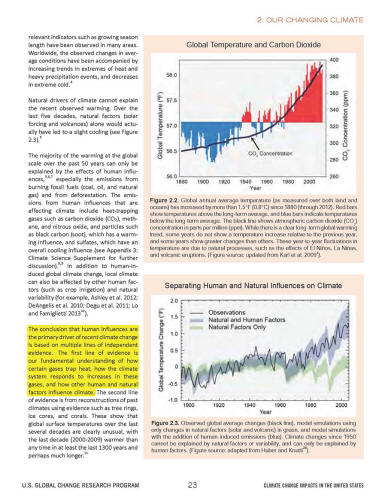
RESPONSE:
Many scientists have provided
ample evidence that the government's finding, used by the
Environmental Protection Agency (EPA), is grossly flawed.
In its Endangerment Finding,
EPA claimed with 90-99% certainty that observed warming in the
latter half of the twentieth century resulted from human
activity. Using the most credible empirical data available, it
is relatively straightforward to soundly reject
each of EPA's
Three LoE.
This U.S. Supreme Court Amicus brief
contains the details:
http://sblog.s3.amazonaws.com/wp-content/uploads/2013/07/GW-Amicus-2013-05-23-Br-of-Amici-Curiae-Scientists-ISO-Petitions-fo…2.pdf
EPA's Greenhouse Gas 'Hot Spot'
theory is that in the tropics, the mid-troposphere must warm
faster than the lower troposphere, and the lower troposphere
must warm faster than the surface, all due to rising CO2
concentrations.
However, this is totally at odds
with multiple robust, consistent, independently-derived
empirical datasets, all showing no statistically significant
positive (or negative) trend in temperature and thus, no
difference in trend slope by altitude. Therefore, EPA's theory
as to how CO2 impacts GAST must be rejected.
Below is a graphical comparison of
their Hot Spot theory versus reality, where reds denote warming
and blues, cooling. Clearly, the government's understanding of
how CO2 gas traps heat is fundamentally
flawed.
Models (top) vs. Measured
Temperatures Changes (bottom)

Temperature
plotted
by Latitude -vs-
Height (Atmospheric pressure)
NCA CLAIM #2 -
"Second LoE - Unusual Warming in recent decades"
"The second line of evidence is
from reconstructions of past climates using evidence such as
tree rings, ice cores, and corals.
These show that global surface
temperatures over the last several decades are clearly
unusual, with the last decade (2000-2009) warmer than any
time in at least the last 1,300 years and perhaps much
longer."
(NCA, Page 23)
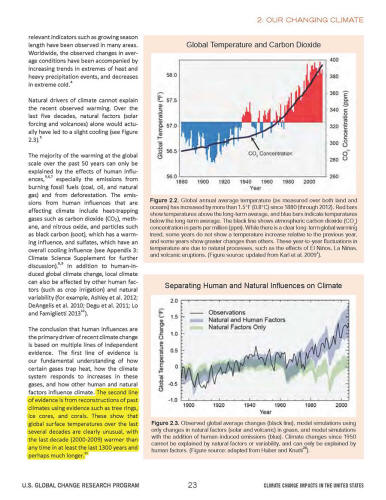
RESPONSE:
"Global Warming" has not been global
and has not set regional records where warming has occurred.
For example, over the last fifty
years, while the Arctic has warmed, the tropical oceans had a
flat trend (see e.g. NOAA Buoy Data: NINO 3.4, Degrees C,
available at
http://www.cpc.ncep.noaa.gov/data/indices/ersst3b.nino.mth.81-10.ascii)
and the Antarctic cooled slightly.
The most significant warming during
this period occurred in the Northern Hemisphere, north of the
tropics but that ceased over the last 15 years or more. Also, as
the figure below shows, over the last 130 years the decade of
the 1930's still has the most U.S. State High Temperatures
records.
And, over the past 50 years, there
were more new
State Record Lows set than
Record Highs. In fact, roughly 70% of the current State Record
Highs were set prior to 1940.

See
NOAA National Climatic Data Ctr.,
State Climate Extremes Committee, Records
(last visited 12/15/ 2013)
If the observed warming over the
last half century can anywhere be claimed to be unusual, it
would have to be where it was greatest - in the Arctic. Both
satellite and surface station data show a warming of about two
degrees Celsius since the 1970′s.
But the surface station data (see
the Figure below) show that warming in context. Recent warming
was very similar to the previous warming from 1900 to 1940,
reaching virtually the same peak.
This refutes the government claim
that recent warming (which occurred when man-made CO2
was rising) was notably different from an era when man-made CO2
was not claimed to be a factor.
It also points out an essential
feature of most credible thermometer records that cover many
decades. Our climate is highly cyclical, driven in fact
by ocean and solar cycles, not carbon dioxide.
Using only the upward trend of the
most recent half cycle to suggest relentless warming is very
deceptive.

NCA CLAIM #3 - Third LoE - "The Climate Models"
The third line of evidence comes
from using climate models to simulate the climate of the
past century, separating the human and natural factors that
influence climate.
(NCA, Page 24)

RESPONSE:
The Administration relied upon
Climate Models, all predicated on the GHG Hot Spot Theory,
that all fail standard model validation and forecast reliability
tests.
These Climate Models are
simulations of reality and far from exact solutions of the
fundamental physics. The models all forecast rising
temperatures beyond 2000 although the GAST trend has recently
been flat. See the figure below.
This is not surprising because EPA
never carried out any published forecast reliability tests. The
government's hugely expensive climate models are monumental
failures.

Modeled Lower
Tropospheric Temperature forecasts
versus actual
measured data
NCA CLAIM #4 -
"Extreme Weather - Temperatures"
"global temperatures are still
on the rise and are expected to rise further."
(NCA, Page 8)
"The most recent decade was the
nation's and the world's hottest on record, and 2012 was the
hottest year on record in the continental United States. All
U.S. regions have experienced warming in recent decades, but
the extent of warming has not been uniform.
(NCA, Page 8)

RESPONSE:
As mentioned in the response to
CLAIM #2, most of the warming in the second half of the 20th
century occurred north of the tropics. But as shown below, this
warming stopped over 17 years ago.
Furthermore, the Hadley Centre (upon
which the government and the UN IPCC heavily relied) recently
announced a forecast that the GAST trend line will likely remain
flat for another five years.
See
Decadal forecast, Met Office
(last visited Dec. 15, 2013).
As for claims about record setting
U.S. temperatures, please see our response to CLAIM #2 above.
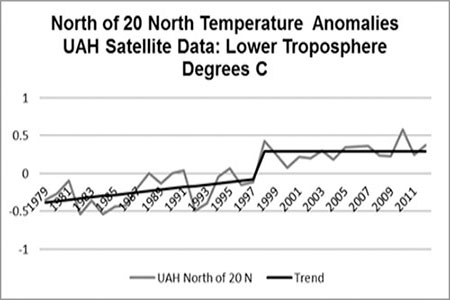
See National Space Sci. & Tech.Ctr.,
North of 20 North Temperature Anomalies UAH Satellite Data:
Lower Troposphere Degrees C, available at
http://vortex.nsstc.uah.edu/data/msu/t2lt/
uahncdc.lt (last visited May 17, 2013).
The National Academy of
Sciences (NAS) was
critical of the draft National Climate Assessment, saying
that,
"An overly narrow focus can
encourage one-sided solutions, for instance by giving an
impression that reducing greenhouse gas emissions alone will
solve all of the major environmental concerns discussed in
this report."
The NAS has also criticized,
"the lack of explicit discussion
about the uncertainties associated with the regional model
projections," saying that "Decision makers need a clear
understanding of these uncertainties in order to fairly
evaluate the actual utility of using these projections as a
basis for planning decisions."
NCA
CLAIM #5
- "Extreme Weather - Hurricanes and
"Droughts and Floods"
"Extreme Weather - Hurricanes"
"The intensity, frequency, and
duration of North Atlantic hurricanes, as well as the
frequency of the strongest (Category 4 and 5) hurricanes,
have all increased since the early 1980s."
(NCA, Page 20)

"Extreme Weather - Droughts and
Floods"
"both extreme wetness and
extreme dryness are projected to increase in many areas."
(NCA, Page 33)
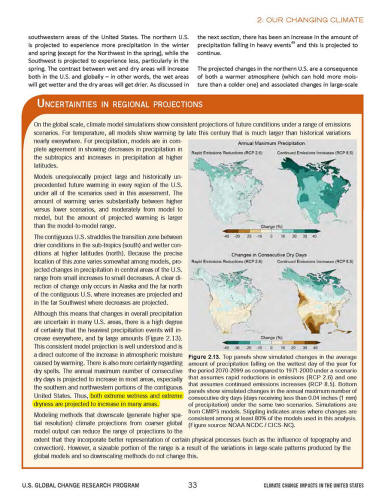
RESPONSE:
According to the UN
Intergovernmental Panel on Climate Change (IPCC,) there is
"high agreement" among leading experts that long-term trends in
weather disasters are
not attributable
to our use of fossil fuels.
Hurricanes have not increased in the
United States in frequency, intensity, or normalized damage
since at least 1900. Currently, the U.S. is enjoying a period of
over eight years without a Category 3 or stronger hurricane
making landfall. Government data also indicate no association
between use of fossil fuels and tornado activity.
The data on droughts paint a similar
picture. The National Oceanic and Atmospheric Administration
found that "Climate change was not a significant part" of the
recent drought in Texas.
And the IPCC found that "in some
regions, droughts have become less frequent, less intense, or
shorter, for example, central North America …."
The IPCC also states there is
"low confidence" in any climate-related trends for flood
magnitude or frequency on a global scale.
Still More NCA CLAIMS
RESPONSE:
All of the other government claims
worth discussing have been answered effectively in other
commentaries. These include those related to ocean and lake ice
levels, sea levels, and ocean alkalinity.
Detailed rebuttals of such
government claims can be found in reports available from,
-
CATO
-
CEI
-
Climate Depot
-
Heritage
-
ICECAP
-
TWTW
-
WUWT
SUMMARY
The Obama Administration's National
Climate Assessment begins with probably their most preposterous
claims:
"Climate change, once considered an
issue for a distant future, has moved firmly into the present."
(NCA, Page 1)
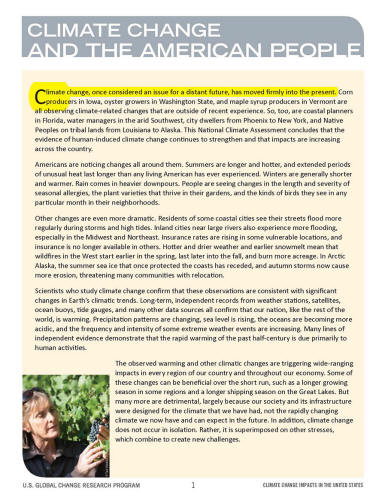
"Evidence for climate change
abounds, from the top of the atmosphere to the depths of the
oceans."
(NCA, Page 7)
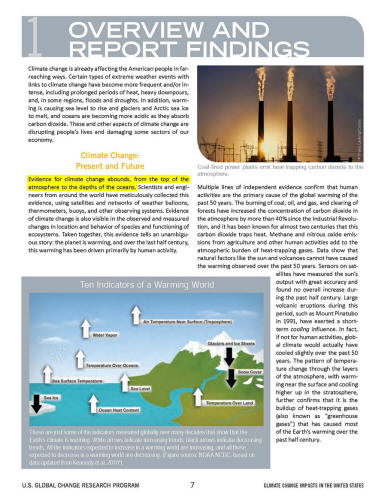
"There is still time to act to limit
the amount of change and the extent of damaging impacts"
(NCA, Page 2)
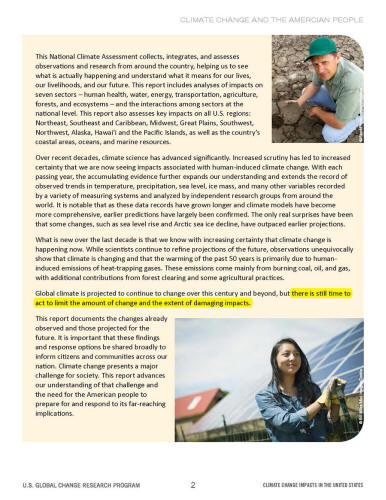
RESPONSE:
This is pure rhetorical nonsense
born of a cynical attempt to exploit short term memories and/or
little knowledge of the Earth's climate history and climate
processes.
Our climate is constantly changing
for perfectly natural reasons that have nothing to do with carbon
dioxide.
With the Earth's vast oceans and
atmosphere never in complete equilibrium, our climate will
always be changing
on time scales from weeks to months to years to decades to centuries
and beyond.
With a star varying cyclically as our
heat source and with an enormous planet like Jupiter tugging on our
orbit around the Sun, dramatic climate changes are expected to
occur. (See pages 39-50 in USCA, Case #09-1322, Document #1312291,
Filed: 06/08/2011.)
However, none of these dramatic climate
changes have any connection to our use of fossil fuels.
Yet the Obama Administration insists on
building a House of Cards predicated on their Three Lines of
Evidence as discussed in CLAIMS 1, 2, and 3 above. With all three of
their Lines of Evidence shown to be invalid, their entire House of
Cards collapses.
For example, if increasing atmospheric
CO2 concentrations do not yield higher GAST, the
claimed CO2 connection to higher sea levels is
lost.
What about their frequent claims that
nearly all scientists agree with their analysis findings?
By ignoring and even denouncing growing
criticism, they have lost the benefit of crucial scientific debates
which are critical to keeping their analyses honest and objective.
In fact, as documented above in response
to Claims 4 and 5, they are even disregarding their usual allies,
the UN IPCC and US National Academy of Sciences, both of whom have
been dialing back apocalyptic claims, not amplifying them due at
least in part to such critical feedback.
Bottom-Line:
This NCA is so grossly flawed it
should play no role in U.S. Energy Policy Analyses and CO2
regulatory processes. As this rebuttal makes clear, the NCA
provides no scientific basis whatsoever for regulating CO2
emissions.
NCA REBUTTAL
AUTHORS/REVIEWERS
Joseph S. D'Aleo
Certified Consultant Meteorologist,
American Meteorological Society Fellow
M.S., Meteorology, University of Wisconsin
B.S., Meteorology (cum laude), University of Wisconsin
Dr. Harold H.
Doiron
Retired VP, Engineering Analysis and Test Division, InDyne,
Inc.
Ex-NASA JSC, Aerospace Consultant
B.S. Physics, University of Louisiana - Lafayette
M.S., PhD. Mechanical Engineering, University of Houston
Dr. Don J.
Easterbrook
Emeritus Professor of Geology, Western Washington University
Ph.D., Geology, University of Washington, Seattle
M.S., Geology, University of Washington, Seattle
B.S., Geology, University of Washington, Seattle
Dr. Theodore R.
Eck
Ph.D., Economics, Mich. State U.; M.A, Economics, U. of
Michigan
Fulbright Professor of International Economics
Former Chief Economist of Amoco Corp. and Exxon Venezuela
Advisory Board of the Gas Technology Institute and Energy
Intelligence Group
Dr. Neil Frank
B.S., Chemistry, Southwestern
College
M.S., Ph.D. Meteorology, Florida State
Former Director of the National Hurricane Center
Dr. Gordon J.
Fulks
Ph.D., Physics, University of Chicago
M.S., Physics, University of Chicago
B.S., Physics, University of Chicago
Dr. William M.
Gray
Emeritus Professor of Atmospheric Science, Colorado State
University
Ph.D., Geophysical Sciences, University of Chicago
M.S., Meteorology, University of Chicago
B.S., Geography, George Washington University
Art Horn
B.Sc. Meteorology Lyndon State College
Teaches Meteorology/Climatology at Tunxis Community College
TV Meteorologist 25 years, lecturer, expert witness, radio
broadcaster
Dr. Thomas P.
Sheahen
Ph.D., Physics, M.I.T.
B.S., Physics, M.I.T.
Dr. S. Fred Singer
Fellow AAAS, APS, AGU
Prof Emeritus of Environmental Sciences, U of VA
Ph. D., Physics, Princeton University
BEE, Ohio State University
Dr. Anthony R.
Lupo
IPCC Expert Reviewer
Professor, Atmospheric Science, University of Missouri
Ph.D., Atmospheric Science, Purdue University
M.S., Atmospheric Science, Purdue University
Dr. Madhav
Khandekar
Retired Scientist, Environment Canada
Expert Reviewer IPCC 2007 Climate Change Documents
George Taylor
Certified Consulting Meteorologist
President Applied Climate Services
Two time President of the American Association of State
Climatologists
B.A. Mathematics, University of California
M.S. Meteorology University of Utah
Dr. James P.
Wallace III
Jim Wallace & Associates, LLC
Ph.D., Economics, Minor in Engineering, Brown University
M.S., Mechanical Engineering, Brown University
B.S., Aeronautical Engineering, Brown University
Dr. George T.
Wolff
Former Chair EPA's Clean Air Scientific Advisory Committee
Ph.D., Environmental Sciences, Rutgers University
M.S., Meteorology, New York University
B.S., Chemical Engineering, New Jersey Institute of
Technology
|














